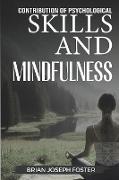- Start
- Contribution of Psychological Skills and Mindfulness
Contribution of Psychological Skills and Mindfulness
Angebote / Angebote:
Participation in elite level sport requires being subjected to considerably stressful training
and competition environments. Psychological skills and mindfulness have been demonstrated to
enhance performance in sport, but less is known regarding how they impact an athlete's well-
being in their sport and in their life. Greater knowledge of this relationship would aid
practitioners in developing holistic, more psychologically well-adjusted student-athletes. To
meet this end, 222 current NCAA Division I fall and winter sport athletes representing six
different sports completed the Mental Health Continuum -Short Form (Keyes et al., 2008), Sport
Mental Health Continuum -Short Form (Foster & Chow, 2016), Ottawa Mental Skills
Assessment Tool-3 (Durand-Bush et al., 2001), Mindfulness Inventory for Sport (Thienot et al.,
2014), and the Athletic Identity Measurement Scale (Brewer et al., 1993). Path analysis indicated
that both psychological skills and mindfulness had significant moderate direct effects on sport
well-being, however, only mindfulness was shown to have a significant moderate direct effect on
global well-being. Correlational data indicated foundational skills and somatic skills, specifically
self-confidence, relaxation, and activation, to be the most salient psychological skills for sport
well-being and global-well. Nonjudgmental acceptance was the most salient mindfulness skill, as
it had a moderate causal path to sport well-being and a strong causal path to global well-being.
The practical implications of the findings include evidence for the importance of developing
these skills in college athletes to enhance their sport well-being and global well-being.
Folgt in ca. 10 Arbeitstagen




